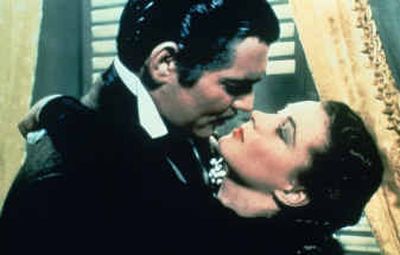Frankly my dear, Scarlett got what was coming to her

When I was twelve years old, and out of school for Christmas break, I picked up a copy of “Gone with the Wind” and spent the next two days curled in a chair, or piled under the quilts on my bed, reading.
When I finally finished the book, somewhere in the early hours of the morning, I was devastated. I burst into my mother’s room, sobbing uncontrollably.
“He LEFT her? Why didn’t you tell me he left her?” I cried.
My poor mother, who was never one to wake easily out of a deep sleep, didn’t know what had hit her. She sat up, blinking in the light. By the time she figured out that the house wasn’t on fire, in fact, there wasn’t anything wrong at all, she didn’t have a lot of sympathy for my despair.
“Scarlett O’Hara wasn’t very nice,” she said. “She deserved what she got.”
“But Mama, she realized that she loved Rhett Butler after all, not Ashley Wilkes, and then Rhett left her,” I wailed.
My mother just fluffed her pillow and turned on her side.
Still hiccupping, I thought about the story I had just read.
The characters were as real to me as anyone. I had fought a war, struggled through hunger and hard times with them. I’d watched Scarlett try to steal Ashley away from Melanie. I’d been there when Melanie gave birth on that hot Atlanta day.
I ached for both Scarlett and Rhett when she miscarried and no one could hear her calling out for him. I wept when their little girl, Bonnie Blue Butler, died and Rhett was driven to near-madness by his grief.
Finally, I said goodbye to Melanie, and witnessed Scarlett’s epiphany that it hadn’t been Ashley at all. The only one she had ever truly loved was Rhett Butler, the man who once told her “You should be kissed often and by somebody who knows how.” (Oh, my.)
And then he walked out on her? It was too much. I fell apart.
I was only 12 years old. All I got out of the book was a love story. I completely missed the other stuff; you know, the cruel reality of slavery, the unimaginable horror of a civil war, the damage that O’Hara’s greed and self-centeredness caused. The big picture escaped me.
I stood beside my mother’s bed, trying to figure out how the story could end the way it did. In my young world, books and movies usually had a happy ending. Everything worked out and the characters lived happily ever after. They didn’t put on their hat and walk off without a backward glance.
Still sniffling, I turned to leave. “She got him back didn’t she?” I asked.
“Actually, I don’t believe she did.” My mother said crisply, turning off the lamp beside her bed. “Sometimes, people break each other’s hearts.”
I left the room feeling like I’d gotten the short end of the sympathy stick. Mother could be blunt, but she was a sucker for anything romantic. I had expected her to reassure me that everything would turn out just as I wanted it to. What I got to dry my tears was a cold splash of reality.
I saw “Gone With the Wind” a couple of times at special showings at the movie palace in my town, and I watched it once on television. But it’s been a long time.
This Christmas, more than 30 years after running to my mother in tears, I got the movie on a DVD. I’ll get back under the quilts on my bed and watch it again, this time through the eyes of a 12-year-old romantic and a middle-aged realist.
When Vivien Leigh turns a swollen and tear-stained face to the camera and says, “Tomorrow is another day,” the 12-year-old will cry. But the realist won’t.
Now I know, just like my mother knew, that another day doesn’t guarantee we’ll get what we want.
Sometimes we get what we deserve.